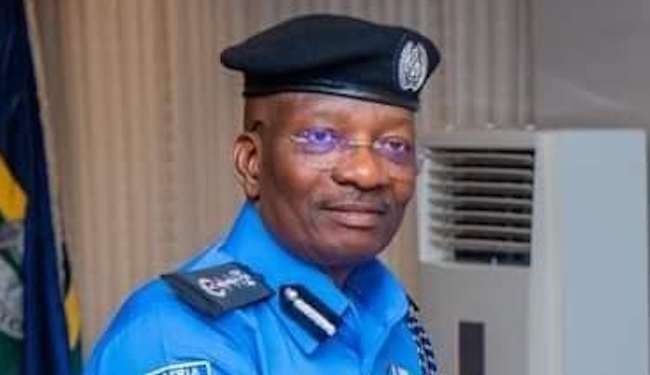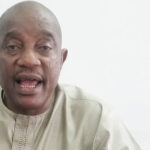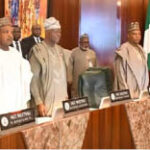Former President Goodluck Jonathan and other stakeholders Monday supported establishment of state police as a way of addressing the security challenges in the country.
But the Inspector-General of Police, Kayode Egbetokun, argued that Nigeria was not yet ripe for state police.
They spoke in Abuja during the national dialogue on state police, with the theme ‘Pathways to Peace: Reimagining Policing in Nigeria.’
The dialogue was organised by the House of Representatives in partnership with the Policy Legislative and Advocacy Centre (PLAC) and the United Nations Development Programme (UNDP).
- Eye Bello vs the State – Another pandora drama
- Gov Otu boosts Rovers FC with increased subvention, team bus
State police is part of the proposed amendments to the 1999 Constitution by the 10th National Assembly.
A bill seeking to alter the relevant sections of the 1999 Constitution to empower states to establish their policing outfits, sponsored by Deputy Speaker Benjamin Okezie Kalu and 14 other lawmakers in the lower chamber had, on February 20, passed second reading.
Jonathan said there was no way Nigeria could have adequate security without state police.
According to him, the question of whether to have state police is not an issue of debate, noting that the issue is how to avoid misuse of state police.
He said during the 2014 national conference organised by his administration, when the issue of state police came up, all delegates unanimously supported it alongside other proposed security measures.
He said: “The issue of the need for states to have their own police is not negotiable. There is no way we can continue with this kidnapping that is going on in this country.
“Commercial kidnapping started around 2006, I don’t want to go into that history, when I was governor. But it started in the Niger Delta. Now, it is all over the country.
“The only thing that can help us if we cannot stop it completely, at least, we reduce it to the barest minimum if the states have their police. “In Bayelsa State, when we took over, the state was almost ungovernable. Abdulsalami would remember that when elections were to be conducted in December 1998, the security situation was so bad.
“When we took over, the state was in crisis. Niger Delta agitation was there. The criminal elements were also operating in the creeks and were causing issues for market women and others until Alamieyeseigha, then the governor, set up the Bayelsa Volunteers that worked with the police. We built stations around the creeks and the boys volunteered to work with the police and that brought the situation down. So, there is no way we can manage internal security if states would not have their police.”
Jonathan asked: “How do we manage the state police and it would not be abused by state political actors? If state political actors are abusing and using state police to harass and make life miserable for people who do not belong to their political parties, would the Commander-in-Chief sit down and watch or would he order the military to go and overrun the state police? Of course, that would bring crises.
“And then the key areas that we have to debate are how do we run the state police vis-a-vis the national security architecture of the country? These things need to be done carefully. There are so many countries that have this (state police). We have also experimented before, during the First Republic.”
The former president also said the Independent National Electoral Commission (INEC) operations must be rejigged.
He also suggested that the use of police in elections be made minimal.
According to him, the laws must be strong enough to eliminate tendencies of political actors misusing the state police for their political interests or intimidate political opponents.
Politicians shouldn’t influence state police operations – Abdulsalami
General Abdulsalam Abubakar in his speech cautioned that politicians should not influence operations of state police when established.
“I think, as much as we’re talking of establishing state police, we should also look into the role vis-a-vis that of our royal fathers.
“It’s absolutely necessary for the politicians as much as possible to avoid exerting influence on the ways the police are going to operate if at all we agree to have the police,” he said.
Abdulsalami also stressed the need to review the roles of traditional institutions in addressing insecurity.
He also said that political leaders must ensure honesty, transparency and accountability in governance to engender peace and security in the country.
Ooni of Ife, Emir of Zazzau back state police
The Emir of Zazzau, Ahmad Nuhu Bamalli, said state police would tackle the security challenges better than the current centralised federal policing system.
“We’re in full support of the state police. My emirate is vulnerable to security challenges. If we can have local police, it can scale down the level of insecurity. I’m optimistic that we should key into it”, he said.
He, however, warned that politicians should not use state police with impunity.
The Ooni of Ife, Oba Adeyeye Enitan Ogunwusi, also urged the National Assembly to make state police come to reality.
He said there was no better time for the country to adopt state police than now, given the current security challenges.
A former Minister of Education, Prof. Tunde Adeniran, said the benefits of state police outweigh its demerits.
He said state police would enhance security at the grassroots.
He, however, suggested that modalities be put in place to prevent abuse of state police as well as address its funding.
IGP says Nigeria not ripe for state police
The Inspector-General of Police, Kayode Egbetokun, said Nigeria was not “mature” for state police.
The IGP, represented by Ben Okolo, an Assistant Inspector-General of Police, said the leadership of the force had resolved that Nigeria was not yet ripe for state police.
He said state governors might abuse and use state police for political gains, thereby causing abuse of power and human rights.
“It’s the submission of the leadership of the Nigeria Police Force that Nigeria is yet to be mature and ready for the establishment of state-controlled police,” he said.
The IGP said the Nigeria Security and Civil Defence Corps (NSCDC) and the Federal Road Safety Corps (FRSC) should be merged to become a department in the police.
He said the recruitment of police personnel should be increased by at least 30,000 annually to meet the minimum policing standard of the United Nations.
He also pointed out the financial requirements for establishing state police, insisting that the state government might lack adequate funding.
My commitment to police reforms unwavering – Tinubu
President Bola Ahmed Tinubu, represented by Vice President Kashim Shettima, said his administration was committed to reforming the police to enhance their efficiency and operations.
He said the broad base of stakeholders present at the dialogue underscored the significance attached to the issues of security in the country.
The president said he looked forward to inputs that would guide the government in taking actions to address security challenges in the country.
He described Jonathan and the former Head of State, General Abdulsalami Abubakar (Rtd), as men of honour who shelved personal interests to entrench democracy and guarantee Nigeria’s continued existence.
Current policing system ineffective – Abbas
The Speaker of the House of Representatives, Abbas Tajudeen, said the emerging security challenges had rendered the current unitary policing system, under the Nigeria Police Force, ineffective, leading to calls for its decentralisation by way of having state police.
He said the current security architecture had been overstretched by the security challenges.
He, however, noted that the House remained neutral in the debate for and against state police.
Abbas said evolving security challenges and other institutional and structural challenges had severely affected the general effectiveness of the police.
It must not be used as tool of oppression – Akpabio
The Senate President, Godswill Akpabio, represented by his deputy, Jibrin Barau, said state police must not be used as a tool of oppression by the powerful in the society.
He said, “If we’re to set up state police departments, we must ensure they’re free from the shackles of politics, religious extremism, tribalism and ethnicity. We must empower them to serve and protect without fear or favour.
“Let us never forget that the power of the state police should never be used as a tool of oppression. Let us ensure that political powers cannot manipulate the state police to silence dissent or target their enemies.
“Let us ensure that the influential do not exert undue influence over the state police, and that justice is blind to wealth, power, politics, or status.”
‘Why state police may not work’
Other speakers at the dialogue said establishing state police would not necessarily make any difference if the government failed to address the drivers of insecurity.
A former spokesman for the Nigerian Air Force, Group Capt. Sadeeq Shehu, urged the government to tackle unemployment, hunger, ethno-religious tensions and poverty.
Archbishop John Onaiyekan said the government should first address the problems with the current federal policing system before talking about establishing state police.
A security consultant, Kabiru Adamu, said most drivers of insecurity were embedded in bad governance, adding that if the government could tackle unemployment, lack of access to education, healthcare and other social services, the insecurity would be tamed.
Let’s not rush – Arase
A former Inspector-General of Police and chairman of the Police Service Commission, Solomon Arase, said while it was good to have conversations on state police, it must not be done in a rush.
He said successive governments had failed to show the political will to implement police reforms.
Arase said a proper groundwork should be done before creating state police so that it would not be hijacked by governors whom he described as being “very powerful.”

 Join Daily Trust WhatsApp Community For Quick Access To News and Happenings Around You.
Join Daily Trust WhatsApp Community For Quick Access To News and Happenings Around You.


